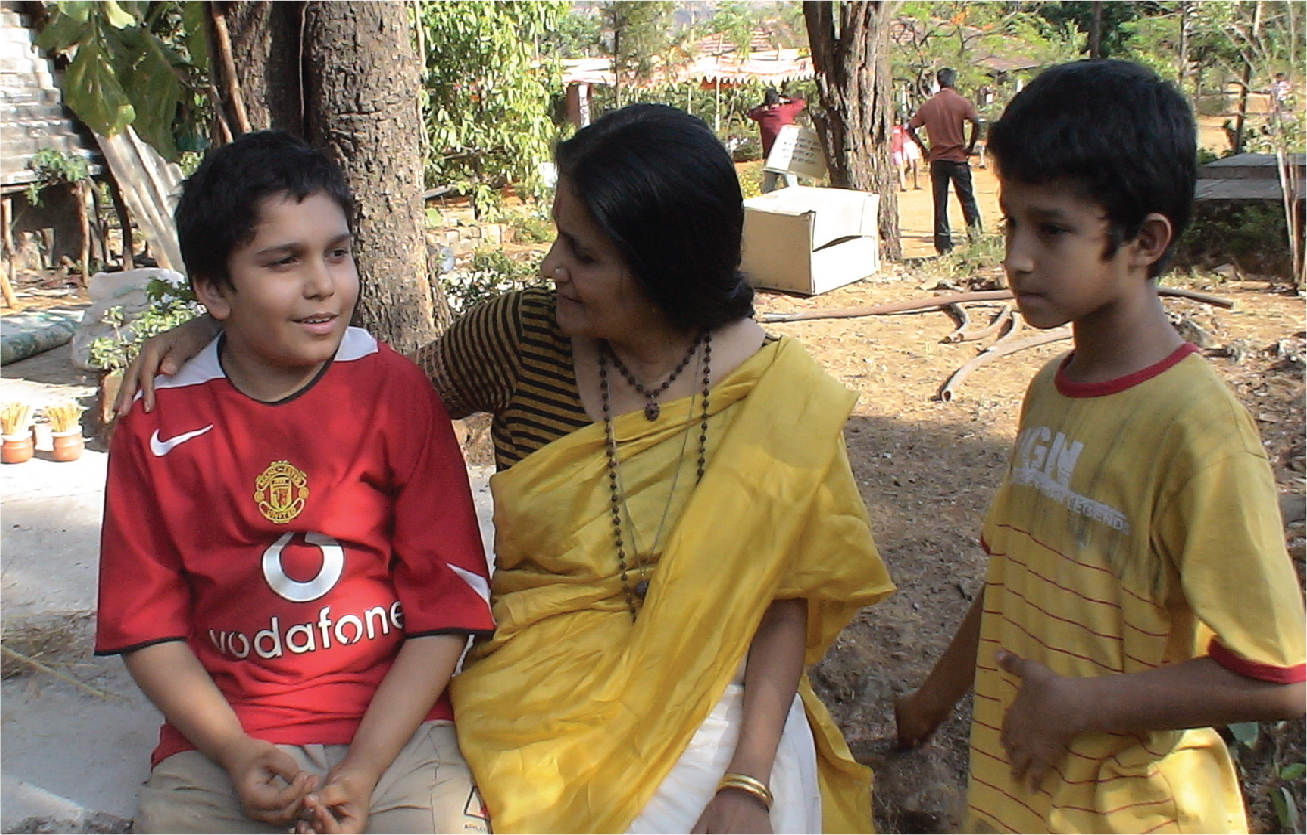The Children’s Camp

The urban children’s programme at the ashram is to fill in the gaps in the education system. It includes a gentle exposure to Indian arts, Indian culture & life styles. It is an introduction to the outdoors, to nature & rural life in a fun way. The ashram-gurukul experience sensitises them to the ‘Divine’ while also giving a taste of community living that is missing in nuclear families.
- To Become comfortable in the outdoors.
- To shed laziness that urban lifestyles induces.
- For an experience of living without gadgets.
- For an early exposure to alternative life styles
- For an understanding that life can be lived simply, without money being center stage at all times.
- For developing skills both actual & thinking skills.
- A respect for indigenous forms & traditions.
Standard Modules
Yoga & Meditation
Environmental Treks
Invoking the Divine
Interactive Dialogues
Primary Modules
Understanding Indian Arts
Connecting with Nature
Hands on Science
Performing Arts & Crafts
Secondary Modules
Holistic Living (food, nature, philosophy)
Invoking Nature / Nature Poems
2 Primary Modules + 1 Secondary Module + Standard Modules (for a 3 nights 4 day retreat)
All programmes include Community service (Seva)
A typical cultural awareness experience retreat is for 3 nights 4 days.
It can be designed for 1 night 2 days or 2 nights 3 days, longer retreats for a week to ten days are also offered. You can also work with us to build your program.
A typical day at the retreat is
6.00 am Wake up
6.30 – 8.00 am Meditation & Yoga
8.00 am – 10.00 am Bath & breakfast
10.30 am – 12.30 pm Module
1.00 – 2.00 pm Lunch
2.00 pm – 3.30 pm Rest
4.00 pm – 6.00 pm Module
8.30 pm Dinner
10.00 pm Retire
The itinerary is subject to change depending upon the need of the program.
This programme is for:
- Children who enjoy learning by doing.
- Children who enjoy the outdoors.
- Children who are sensitive & artistic by nature and not addicted to interactive gaming & digital entertainment.
Interested ?
 Join a program
Join a program
 Contact
Contact
Programs you may like

The traditional arts and crafts were always eco friendly using locally available natural materials that are reusable & biodegradable. With the onslaught of capitalism & large scale productions that needed to go global and have ‘box office’ value, this fundamental principle of traditional art was neglected. The Land Art programme at Shaktiyogashram is to re learn this eco friendly approach to art that is organic, cost-effective and actually conducive to creativity. It encourages the innocent joy of pure creativity, free of the need to consume, sell or market.The pristine & naturally rich environs of the ashram are a perfect setting for this programme.
The Ashram

An educational-cultural centre dedicated to study and practice of classical Indian arts and sciences with a spiritual and environmental consciousness.
Shaktiyogashrama is committed to the values of living in a commune. But it is a commune that is held together not by dogmatic religious beliefs but by the humanitarian values of love, peace & universal brotherhood.At Shaktiyogashrama this very spirit of the Gurukul system is embodied within all that we are and all that we practice.
Participants are requested to not carry their urban stress, consumerism, extroversion, shallow entertainment forms and digital obsessions to the ashram so that learning can happen.
We are a drug, alcohol, smoking and meat free campus. The community abides by a few agreements and we ask for your help in continuing to abide by them.
We are taking some steps to make this gurukul a low waste zone and we request for your help in reducing waste (of all kinds) during your visit. Participants are requested do not bring packaged snacks or stuff that will generate waste here. In case if you do get them, then we request you to carry your waste out with you when you leave.
The ambience encourages living close to nature, living in simplicity and living with an inner discipline.
and emphasise the need for spiritual orientation in education.
The space is dedicated to study and practice of classical Indian arts and sciences with a spiritual and environmental consciousness.
The residential short term programs area an integration of spirituality, ecology, lifestyle and the classical arts – with an emphasize that yoga is the chief goal of all these disciplines.
The rural initiative is an integral area of the gurukul, with a view to empower, educate, to build self-esteem, inculcate the scientific temperament and to introduce an arts culture.
Babaji scouted the entire Peth, Shahpur, Telbaila and Bhamburde village in Maharashtra for days on end before he set his heart on the beautiful scenic land in Telbaila village that was surrounded by mountains on all sides. Located in the midst of nature in all its glory, the Ashram is placed 32 kms away from its closest urban dwelling, Lonavla.
The valley is situated in the midst of mango trees and bamboo forests with seasonal waterfalls. It is cradled by the serene yet formidable mountains that surround it on all sides. A Durga temple on the top of mountain is a popular trekking and hiking point.










